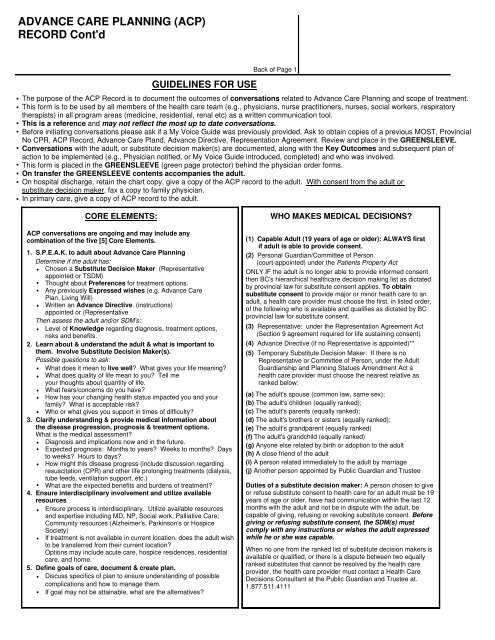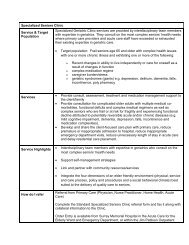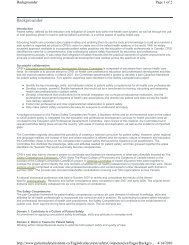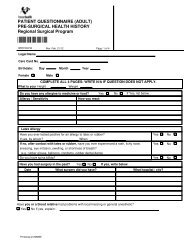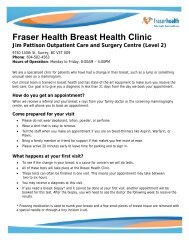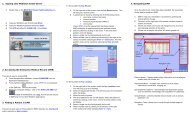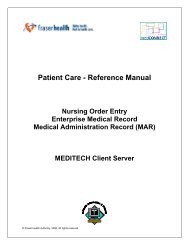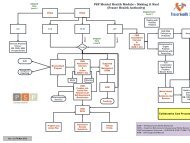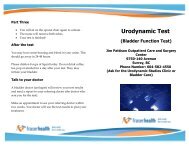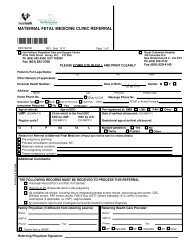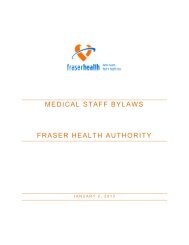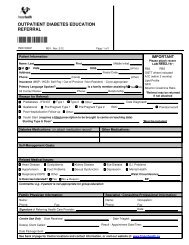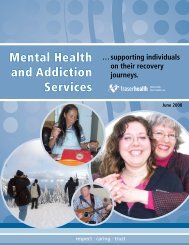Advance Care Planning - Physician
Advance Care Planning - Physician
Advance Care Planning - Physician
Create successful ePaper yourself
Turn your PDF publications into a flip-book with our unique Google optimized e-Paper software.
ADVANCE CARE PLANNING (ACP)<br />
RECORD Cont'd<br />
<br />
<br />
<br />
<br />
<br />
<br />
<br />
<br />
<br />
GUIDELINES FOR USE<br />
Back of Page 1<br />
The purpose of the ACP Record is to document the outcomes of conversations related to <strong>Advance</strong> <strong>Care</strong> <strong>Planning</strong> and scope of treatment.<br />
This form is to be used by all members of the health care team (e.g., physicians, nurse practitioners, nurses, social workers, respiratory<br />
therapists) in all program areas (medicine, residential, renal etc) as a written communication tool.<br />
This is a reference and may not reflect the most up to date conversations.<br />
Before initiating conversations please ask if a My Voice Guide was previously provided. Ask to obtain copies of a previous MOST, Provincial<br />
No CPR, ACP Record, <strong>Advance</strong> <strong>Care</strong> Pland, <strong>Advance</strong> Directive, Representation Agreement. Review and place in the GREENSLEEVE.<br />
Conversations with the adult, or substitute decision maker(s) are documented, along with the Key Outcomes and subsequent plan of<br />
action to be implemented (e.g., <strong>Physician</strong> notified, or My Voice Guide introduced, completed) and who was involved.<br />
This form is placed in the GREENSLEEVE (green page protector) behind the physician order forms.<br />
On transfer the GREENSLEEVE contents accompanies the adult.<br />
On hospital discharge, retain the chart copy, give a copy of the ACP record to the adult. With consent from the adult or<br />
substitute decision maker, fax a copy to family physician.<br />
In primary care, give a copy of ACP record to the adult.<br />
CORE ELEMENTS:<br />
ACP conversations are ongoing and may include any<br />
combination of the five [5] Core Elements.<br />
1. S.P.E.A.K. to adult about <strong>Advance</strong> <strong>Care</strong> <strong>Planning</strong><br />
Determine if the adult has:<br />
Chosen a Substitute Decision Maker (Representative<br />
appointed or TSDM)<br />
Thought about Preferences for treatment options.<br />
Any previously Expressed wishes (e.g. <strong>Advance</strong> <strong>Care</strong><br />
Plan, Living Will)<br />
Written an <strong>Advance</strong> Directive. (instructions)<br />
appointed or (Representative<br />
Then assess the adult and/or SDM's:<br />
Level of Knowledge regarding diagnosis, treatment options,<br />
risks and benefits.<br />
2. Learn about & understand the adult & what is important to<br />
them. Involve Substitute Decision Maker(s).<br />
Possible questions to ask:<br />
What does it mean to live well What gives your life meaning<br />
What does quality of life mean to you Tell me<br />
your thoughts about quantity of life.<br />
What fears/concerns do you have<br />
How has your changing health status impacted you and your<br />
family What is acceptable risk<br />
Who or what gives you support in times of difficulty<br />
3. Clarify understanding & provide medical information about<br />
the disease progression, prognosis & treatment options.<br />
What is the medical assessment<br />
<br />
<br />
<br />
<br />
Diagnosis and implications now and in the future.<br />
Expected prognosis: Months to years Weeks to months Days<br />
to weeks Hours to days<br />
How might this disease progress (include discussion regarding<br />
resuscitation (CPR) and other life prolonging treatments (dialysis,<br />
tube feeds, ventilation support, etc.)<br />
What are the expected benefits and burdens of treatment<br />
4. Ensure interdisciplinary involvement and utilize available<br />
resources<br />
Ensure process is interdisciplinary. Utilize available resources<br />
and expertise including MD, NP, Social work, Palliative <strong>Care</strong>;<br />
Community resources (Alzheimer's, Parkinson's or Hospice<br />
Society)<br />
If treatment is not available in current location, does the adult wish<br />
to be transferred from their current location<br />
Options may include acute care, hospice residences, residential<br />
care, and home.<br />
5. Define goals of care, document & create plan.<br />
Discuss specifics of plan to ensure understanding of possible<br />
complications and how to manage them.<br />
If goal may not be attainable, what are the alternatives<br />
WHO MAKES MEDICAL DECISIONS<br />
(1) Capable Adult (19 years of age or older): ALWAYS first<br />
if adult is able to provide consent.<br />
(2) Personal Guardian/Committee of Person<br />
(court-appointed) under the Patients Property Act<br />
ONLY IF the adult is no longer able to provide informed consent<br />
then BC's hierarchical healthcare decision making list as dictated<br />
by provincial law for substitute consent applies. To obtain<br />
substitute consent to provide major or minor health care to an<br />
adult, a health care provider must choose the first, in listed order,<br />
of the following who is available and qualifies as dictated by BC<br />
provincial law for substitute consent.<br />
(3) Representative: under the Representation Agreement Act<br />
(Section 9 agreement required for life sustaining consent)<br />
(4) <strong>Advance</strong> Directive (if no Representative is appointed)**<br />
(5) Temporary Substitute Decision Maker: If there is no<br />
Representative or Committee of Person, under the Adult<br />
Guardianship and <strong>Planning</strong> Statues Amendment Act a<br />
health care provider must choose the nearest relative as<br />
ranked below:<br />
(a) The adult's spouse (common law, same sex);<br />
(b) The adult's children (equally ranked);<br />
(c) The adult's parents (equally ranked);<br />
(d) The adult's brothers or sisters (equally ranked);<br />
(e) The adult's grandparent (equally ranked)<br />
(f) The adult's grandchild (equally ranked)<br />
(g) Anyone else related by birth or adoption to the adult<br />
(h) A close friend of the adult<br />
(i) A person related immediately to the adult by marriage<br />
(j) Another person appointed by Public Guardian and Trustee<br />
Duties of a substitute decision maker: A person chosen to give<br />
or refuse substitute consent to health care for an adult must be 19<br />
years of age or older, have had communication within the last 12<br />
months with the adult and not be in dispute with the adult, be<br />
capable of giving, refusing or revoking substitute consent. Before<br />
giving or refusing substitute consent, the SDM(s) must<br />
comply with any instructions or wishes the adult expressed<br />
while he or she was capable.<br />
When no one from the ranked list of substitute decision makers is<br />
available or qualified, or there is a dispute between two equally<br />
ranked substitutes that cannot be resolved by the health care<br />
provider, the health care provider must contact a Health <strong>Care</strong><br />
Decisions Consultant at the Public Guardian and Trustee at.<br />
1.877.511.4111


